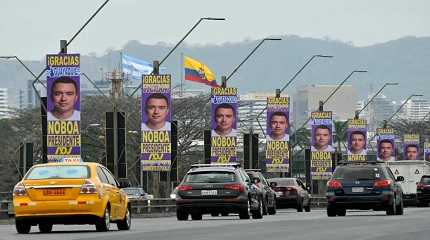
QUITO, Oct 15 (NNN-AGENCIES) — Ecuadorans vote for a new president Sunday in the midst of a bloody drug war and a rash of political assassinations that cut short the bid of a popular candidate.
The remaining finalists – lawyer Luisa Gonzalez, 45, and banana empire heir Daniel Noboa, 35 – campaigned in bullet-proof vests as a climate of fear grips the once-peaceful country.
Both have vowed to prioritise the escalating violence.
The main concern of Ecuadorans, according to recent polls, is crime and insecurity in a country where the murder rate has quadrupled in the four years to 2022. Some 54,000 police were deployed to keep the vote safe.
Long a haven between major cocaine exporters Colombia and Peru, violence in the South American nation has exploded in recent years as enemy gangs with links to Mexican and Colombian cartels vie for control.
The fighting has seen at least 460 inmates massacred in prison since February 2021 – many beheaded or burned alive in mass riots.
And the bloodbath has spilled into the streets, with gangs dangling headless corpses from city bridges and detonating car bombs outside police stations in a show of force.
Some 3,600 Ecuadorans have been murdered so far this year, according to the Ecuadoran Organized Crime Observatory, including nearly a dozen politicians.
In August, the violence claimed the life of anti-graft and anti-cartel journalist and presidential candidate Fernando Villavicencio, mowed down in a barrage of submachine gun fire after a campaign speech.
He had been polling in second place.
A state of emergency was declared after Villavicencio’s assassination, and Noboa and Gonzalez both campaigned with heavy security details.
Reporters following them have also had to don protective jackets and helmets and travel in armoured vehicles. Many have received death threats.
Seven suspects in Villavicencio’s assassination were killed in prison.
Whoever wins Sunday will be elected to only 16 months in office – completing the term of incumbent Guillermo Lasso who called a snap vote to avoid possible impeachment for alleged embezzlement.
They will be allowed to run again for the 2025-29 presidential term, and the one after that.
Both relative unknowns, a win for either candidate would make history: Gonzalez becoming Ecuador’s first woman president, or Noboa its youngest.
Gonzalez is the handpicked candidate of socialist ex-president Rafael Correa, who governed from 2007 to 2017 and lives in exile in Belgium to avoid serving an eight-year prison term for graft – another major concern in the South American country.
Her rival, Noboa, is the son of one of Ecuador’s richest men who himself has five failed presidential bids behind his name.
Closing their campaigns Thursday, both candidates promised a better future.
“Thank you for believing in this political project, for believing that the youth can change a country,” Noboa told supporters in the southwestern fishing town of Muey.
“Together we are going to change this country.”
For her part, Gonzalez travelled to Guayaquil, the city hardest hit by the recent violence, where she told supporters: “In unity we will raise this Ecuador… that cries out for peace, for security, for employment, for health, for medicine.”
Ecuador has a poverty rate of 27 per cent, with a quarter of the population either unemployed or holding down an informal job.
Opinion polls list unemployment as voters’ second concern.
Gonzalez has promised more social spending if she is elected, especially on education and healthcare, while Noboa has vowed he will ensure “progress for everyone.”
From eight candidates, Gonzalez took the most votes in the first voting round in August with 34 per cent, followed by Noboa with 23 per cent.
Opinion polls predict a close race Sunday, with a high percentage of undecided voters.
Neither Gonzalez nor Noboa will have the luxury of an absolute majority backing their projects in parliament, and with only 16 months in office, either would face an uphill battle to push through any reforms.
Voting is compulsory for 13.4 million eligible voters in the country of 16.9 million.
Polling stations will be open for 10 hours from 7 am.




